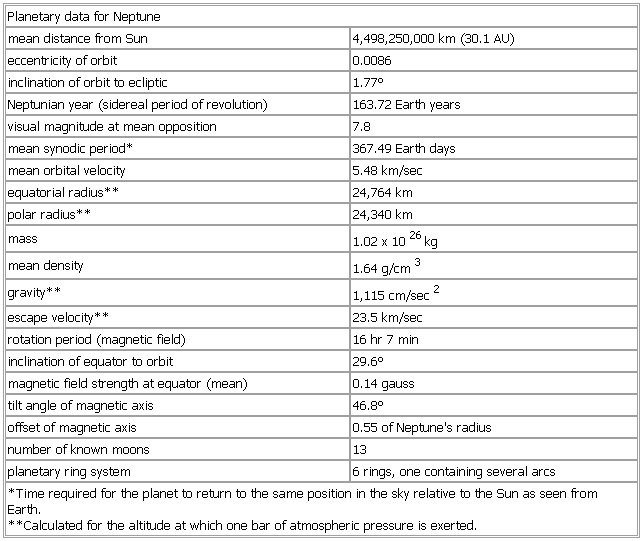Planetary data for Neptune
- Planetary data for Neptune
-
Planetary data for Neptune
mean distance from Sun 4,498,250,000 km (30.1 AU)
eccentricity of orbit 0.0086
inclination of orbit to ecliptic 1.77°
Neptunian year (sidereal period of revolution) 163.72 Earth years
visual magnitude at mean opposition 7.8
mean synodic period* 367.49 Earth days
mean orbital velocity 5.48 km/sec
equatorial radius** 24,764 km
polar radius** 24,340 km
mass 1.02 x 1026 kg
mean density 1.64 g/cm3
gravity** 1,115 cm/sec2
escape velocity** 23.5 km/sec
inclination of equator to orbit 29.6°
magnetic field strength at equator (
mean)
0.
14 gauss
tilt angle of magnetic axis 46.8°
offset of magnetic axis 0.55 of Neptune's radius
number of known moons 13
planetary ring system 6 rings, one containing several arcs
*Time required for the planet to return to the same position in the sky relative to the Sun as seen from Earth.
**Calculated for the altitude at which one bar of atmospheric pressure is exerted.
See as table:
* * *
Universalium.
2010.
Look at other dictionaries:
neptune — /nep toohn, tyoohn/, n. any whelk of the genus Neptunea, esp. N. decemcostata, common along the eastern coast of North America and having a shell with seven to ten raised reddish brown spiral ridges on a pale beige or yellow background. [ < NL… … Universalium
Neptune — /nep toohn, tyoohn/, n. 1. the ancient Roman god of the sea, identified with the Greek god Poseidon. 2. the sea or ocean: Neptune s mighty roar. 3. Astron. the planet eighth in order from the sun, having an equatorial diameter of 30,200 mi.… … Universalium
Planetary habitability — is the measure of a planet s or a natural satellite s potential to develop and sustain life. As the existence of life beyond Earth is currently uncertain, planetary habitability is largely an extrapolation of conditions on Earth and the… … Wikipedia
Neptune — This article is about the planet. For other uses, see Neptune (disambiguation). Neptune … Wikipedia
Planetary science — Planetary science, also known as planetology and closely related to planetary astronomy, is the science of planets, or planetary systems, and the solar system. Incorporating an interdisciplinary approach, planetary science draws from diverse… … Wikipedia
Neptune Orbiter — For the cancelled 1990s NASA Neptune Orbiter, see Mariner Mark II Neptune Orbiter was a proposed NASA unmanned planetary spacecraft to explore the planet Neptune. It was envisioned that it would be launched sometime around 2016 and take 8 to 12… … Wikipedia
Planetary mass — The four terrestrial planets in the Solar System, to scale. Note that Mars (to the far right) is about half the diameter of the Earth, but only one ninth of the mass … Wikipedia
Neptune X — Psamathée (lune) Pour les articles homonymes, voir Psamathée. Psamathée Caractéristiques orbitales (Époque 10/06/2003, JJ 2452801.5[1] … Wikipédia en Français
Neptune XIII — Néso (lune) Pour les articles homonymes, voir Néso. Néso Caractéristiques orbitales (Époque 10/06/2003, JJ 2452801.5[1]) … Wikipédia en Français
Discovery of Neptune — New Berlin Observatory at Linden Street, where Neptune was discovered observationally. Neptune was mathematically predicted before it was directly observed. With a prediction by Urbain Le Verrier, telescopic observations confirming the existence… … Wikipedia

